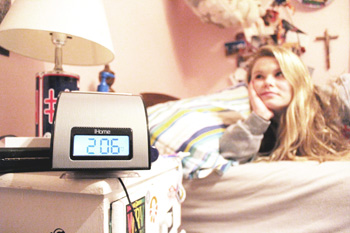
As you lay in bed, you continue to toss and turn as your mind wonders and replays your daily events. Your mind recites random fragments from conversations and you eventually feel the anxiety of not obtaining a sufficient amount of sleep for the day ahead. This is a common condition in many young adults referred to as Insomnia.
Insomnia is a sleep disorder characterized by difficulty falling or staying asleep for periods of time. This can include one or more of the following symptoms: difficulty falling asleep, waking up often during the night, having trouble going back to sleep, or waking up too early in the morning.
“I deal with Insomnia occasionally,” junior Kelly Pratt said. “When I’m worried about something and I can’t do anything about it, I just lay there and my anxiety prevents me from falling asleep.”
Sleep is the body’s way of restoring its own energy levels and this affects the body both mentally and physically. A good night’s rest is the best way to recover and prevent an illness, manage stress and solve problems.
During sleep, the brain naturally goes through two states, rapid eye movement (REM) and non-rapid eye movement (NREM). This cycle consists of four stages, while dreams occur during the REM sleep.
There are two distinct types of Insomnia, primary and secondary. With primary Insomnia, the problems are not directly related to any other illness or health condition. While secondary Insomnia is triggered by a health condition, medication or other substance abuse which prohibits normal sleeping patterns.
“[My situation would be classified as primary insomnia because] it’s just an occasional thing for me. I usually sleep just fine,” Pratt said.
Acute Insomnia lasts a short time, from one night to a few weeks, while chronic Insomnia is when a person has these issues three nights a week or more for at least a month straight.
Significant life stress, illness, emotional or physical discomfort and environmental factors (such as loud noise or bright lights) are causes of acute Insomnia. Eliminating as many of these distractions as possible will help normal sleep patterns reappear.
“I usually have problems sleeping when I have too much on my mind,” senior Andrew Boyd said.
Chronic Insomnia is a more serious matter. It can be caused by depression, anxiety, chronic stress and discomfort at night. To help this matter, behavioral changes should take place. Methods such as relaxation exercises and altered sleeping patterns could become useful in sleeping through the night once more.
This lack of a full REM sleep cycle can affect the memory and concentration throughout the day. Other symptoms include irritability and tiredness all day long.
“I deal with [my sleep deprivation] by trying to relax and keep my mind clear of thoughts,” Boyd said.
Resorting to sleeping aids, such as pills, is not a safe alternative. Sure it may be a quick short term fix, but in the long run it will only cause problems. Aids like these may become addictive and relying on these will hinder your ability to sleep naturally.












